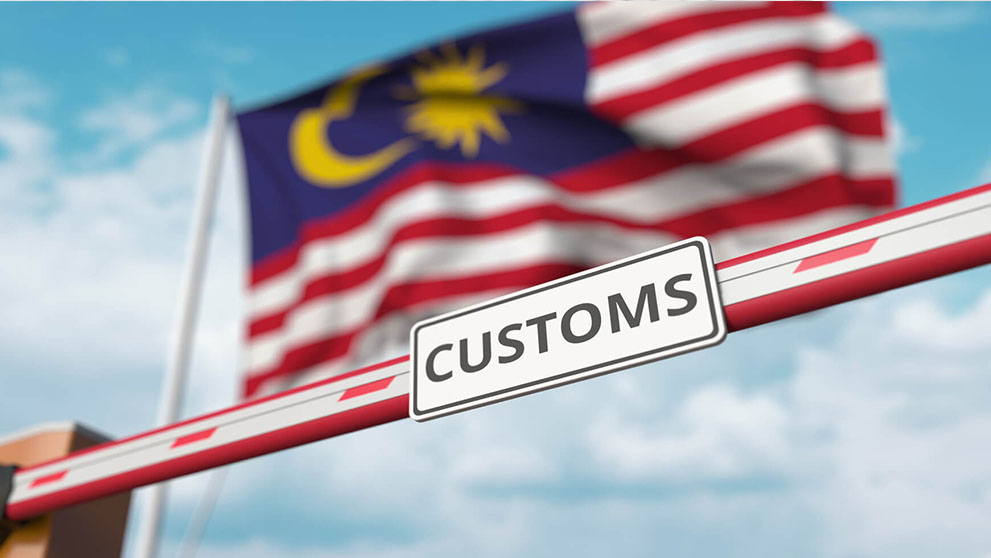Import duties and taxes, also known as customs duties, are fees that a country charges when goods are entering the country.
There are 3 types of duties and taxes involved, namely, import duty, excise duty, and sales tax.
Here are the answers to all common questions shippers have about Malaysia import duties and taxes -
Malaysia Customs Duty and Exemptions
Customs duty is a tax charged on goods when they cross international borders. This tax ensures fair competition between imported goods and locally produced items.
This includes import duty, export duty, surtax, surcharge, or cess under specific laws.
On the other hand, tax is a charge at the national level that is added when goods are bought or sold within a country. It can also apply to goods entering or leaving a country during import or sale domestically.
The 2 common factors that determine duties and taxes are HS code classification and value of goods.
1. HS Code Classification:
Products are sorted into categories using an HS code, each with different duty and tax rates.
2. Value of Goods:
Total value includes product’s cost, insurance fees and freight charges (known as CIF).
Yes, there are 3 main taxes that you may need to pay, which are import duty, import sales tax, and excise duty when you bring items into Malaysia through shipping.
Yes. Goods below 500MYR are exempt from import duty, following the de minimis rule.
But, they will be charged with a 10% low value goods tax.
3 main types of exemptions available for import duty, sales tax, and excise duty.
These exemptions apply when goods meet the specific conditions defined in their respective provisions.
Businesses with permits like ATA Carnet, temporary import, and free trade agreements, or located in free industrial zones, free commercial zones, or licensed manufacturing warehouses can be eligible for more import duty and sales tax exemptions.
De Minimis is a value in which goods can be brought into a country without having to pay duties or taxes.
Eligibility for De Minimis in Malaysia:
The total value of Cost, Insurance, and Freight (CIF) is not more than RM 500 per shipment.
Applies only to goods sent by air courier service (including postal service), not by road or sea.
The goods must not be listed under the Customs (Prohibition of Imports) Order 2023, regardless of their value.
The goods must not be subject to excise duties or import sales tax.
Malaysia Import Duty
Import duty, also referred to as customs duty, is a duty charged on goods entering Malaysia from overseas through road, sea, or air.
The import duty rate is charged either on an ad valorem basis (as a percentage of the value of the goods) ranging from 0% to 60% or on a specific basis (as a fixed sum of money per unit).
To calculate the import duty, you will need to multiply the CIF value by the import duty rate.
CIF Value:
Total sum of cost, insurance and freight
Import Duty Rate:
The rate is determined by the product HS Code.
Formula:
(Cost + Insurance + Freight) x Import Rate = Import Duty Value
For more detailed guidance on this process, refer to this import duty step-by-step calculation guide.
Malaysia Excise Duty
Excise duty is a tax imposed on specific goods imported into or manufactured in Malaysia for domestic use. It serves as a regulatory tool to influence consumer behaviour by discouraging the consumption of goods like tobacco and alcohol.
Excise Duty applies to only 7 categories of goods:
Motor vehicles
Alcoholic beverages
Cigarettes include Tobacco and Cigars
Mahjong Tiles
Playing Cards
Sugar-Sweetened Beverages (SSB)
Premix preparations (will be effective on 1st March 2024)
To calculate the excise duty, you will need to multiply the sum of CIF value and import duty by the excise duty rate.
CIF Value:
Total sum of cost, insurance and freight
Excise Duty Rate:
The rate is determined by the product HS Code.
Formula:
(CIF Value + Import Duty) x Excise Duty Rate = Excise Duty Value
For more detailed guidance on this process, refer to this step-by-step guide on calculating excise duty.
Malaysia Import Sales Tax
Import sales tax (SST) is a tax charged on certain goods brought into the country or manufactured locally and sold, used, or disposed of.
There are two types: sales tax on taxable goods and sales tax on low-value goods (LVG).
The sales tax on taxable goods applies to items imported into Malaysia or made domestically, while the sales tax on low-value goods applies to items with a sales value of RM500 or less delivered from overseas to customers in Malaysia.
The import sales tax rate is 5% or 10% or a specific rate depending on the product category as declared by the harmonised systems code (HS code).
To calculate the import sales tax, you will need to multiply the sum of CIF value, import duty value, and excise duty value by the sales tax rate.
CIF Value:
Total sum of cost, insurance and freight
Sales Tax Rate:
The rate is determined by the product HS Code.
Formula:
(CIF Value + Import Duty + Excise Duty) x Sales Tax Rate = Sales Tax Value
For more detailed guidance on this process, refer to this import sales taxt step-by-step calculation guide.
The goods are listed in the Sales Tax (Goods Exempted from Sales Tax) Order 2022.
Some common examples are -
Unprocessed daily food items
Pharmaceutical products
Everyday essentials
Malaysia Export Duty
Most goods are not liable to export duty in Malaysia.
The minor exports that are subject to export duty, ranging from 5% to 20% are crude petroleum, palm oil, or items like live animals, palm nuts, bamboo, rattan, certain metal ores, petroleum products, and metals.








